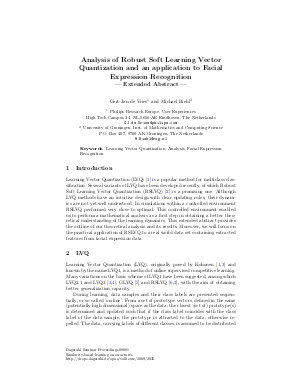Analysis of Robust Soft Learning Vector Quantization and an application to Facial Expression Recognition
Authors Gert-Jan de Vries, Michael Biehl
-
Part of:
Volume:
Dagstuhl Seminar Proceedings, Volume 9081
Part of: Series: Dagstuhl Seminar Proceedings (DagSemProc) - License:
 Creative Commons Attribution 4.0 International license
Creative Commons Attribution 4.0 International license
- Publication Date: 2009-06-23
File

PDF
DagSemProc.09081.4.pdf
- Filesize: 166 kB
- 5 pages
Document Identifiers
Subject Classification
Keywords
- Learning Vector Quantization
- Analysis
- Facial Expression Recognition
Metrics
- Access Statistics
-
Total Accesses (updated on a weekly basis)
0PDF Downloads0Metadata Views
Abstract
Learning Vector Quantization (LVQ) is a popular method for multiclass classification. Several variants of LVQ have been developed recently, of which Robust Soft Learning Vector Quantization (RSLVQ) is a promising one. Although LVQ methods have an intuitive design with clear updating rules, their dynamics are not yet well understood. In simulations within a controlled environment RSLVQ performed very close to optimal. This controlled environment enabled us to perform a mathematical analysis as a first step in obtaining a better theoretical understanding of the learning dynamics. In this talk I will discuss the theoretical analysis and its results. Moreover, I will focus on the practical application of RSLVQ to a real world dataset containing extracted features from facial expression data.
Cite As Get BibTex
Gert-Jan de Vries and Michael Biehl. Analysis of Robust Soft Learning Vector Quantization and an application to Facial Expression Recognition. In Similarity-based learning on structures. Dagstuhl Seminar Proceedings, Volume 9081, pp. 1-5, Schloss Dagstuhl – Leibniz-Zentrum für Informatik (2009)
https://doi.org/10.4230/DagSemProc.09081.4
BibTex
@InProceedings{devries_et_al:DagSemProc.09081.4,
author = {de Vries, Gert-Jan and Biehl, Michael},
title = {{Analysis of Robust Soft Learning Vector Quantization and an application to Facial Expression Recognition}},
booktitle = {Similarity-based learning on structures},
pages = {1--5},
series = {Dagstuhl Seminar Proceedings (DagSemProc)},
ISSN = {1862-4405},
year = {2009},
volume = {9081},
editor = {Michael Biehl and Barbara Hammer and Sepp Hochreiter and Stefan C. Kremer and Thomas Villmann},
publisher = {Schloss Dagstuhl -- Leibniz-Zentrum f{\"u}r Informatik},
address = {Dagstuhl, Germany},
URL = {https://drops.dagstuhl.de/entities/document/10.4230/DagSemProc.09081.4},
URN = {urn:nbn:de:0030-drops-20356},
doi = {10.4230/DagSemProc.09081.4},
annote = {Keywords: Learning Vector Quantization, Analysis, Facial Expression Recognition}
}
